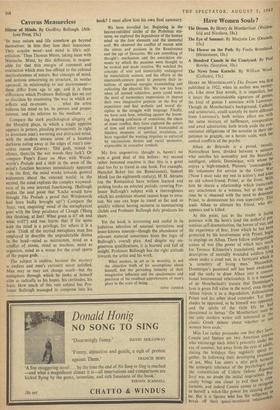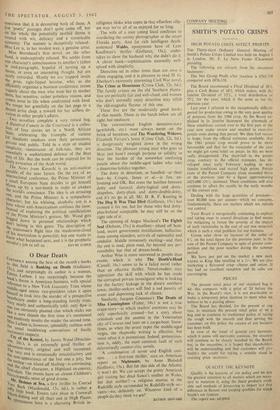Have Women Souls?
The News from Karachi. By William Wood. (Gollancz, 15s.) HENRY DE MONTHERLANT'S The Dream was first published in 1922, when its author was twenty- six. Like most first novels, it is imperfect, but it bears the unmistakable signature of genius, the kind of genius I associate with Lawrence. Though de Montherlant's background, Catholic and aristocratic, could scarcely be more different from Lawrence's, both writers affect me with the same mixture of bafflement, exasperation and awed admiration; both brush aside the con- ventional obligations of the novelist in their im- patience to grapple, on a heroic scale, with the central conflicts of the psyche.
Alban de Bricoule is a proud, moody Nietzschean hero, divided between a mistress who satisfies his sensuality and the beautiful, intelligent, athletic Dominique, with whom he enjoys a high-minded, Platonic 'comradeshiP. He volunteers for service in the Great War ('Now I must take my rest in action'), and joins an old school-friend, Prinet, at the front. With him he shares a relationship which transcends any attachment to a woman, but at the same time he is obsessed with the need to dominate Prinet, to demonstrate his own superiority. This leads Alban to alienate his friend. who dis- appears and is killed.
At this point, just as the reader is losing patience with the hero's (and the author's) Pre; tentious self-dramatisation, the horror of war, and the experience of fear, from which he has been protected by his involvement with Prinet, begin to impinge on Alban. There follow unforgettable sfocernTeseroefncweaKr iltmhearptionw's notably a description of mortally wounded soldiers lying e rt translation), s lwa thi which
,
silent under a cruel sun, in a farmyard which, 15 'a cemetery of living men.' Meanwhile, Dominique's passional self has been awakened, and she seeks to draw Alban into a conven- tional heterosexual relationship. It is a measure of de Montherlant's stature that Dominique ,.s love is given full value in the novel, even though Alban rejects it as a degradation, dishonouring Prinet and his other dead comrades. 'Let these shades be appeased, as he himself was aPPease,;
ile,
and the spirits of the virile life he haue threatened to betray.' De Montherlant the only modern writer still interested in t classic Greek debate about whether or riot classic have souls.'
Miss Lee rather persuades one that they have. Connie and Spence are two American cousin who encourage each Other's precocity under the eye of summer, but away from the eyes of adults, during be during the holidays they regularly spend to- gether. gether. In following their developing awareness of sex, Miss Lee steers a nice path betweed the antiseptic tolerance of the psychologist a11,, the romanticism of Colette (whose Breland the was no doubt the initial inspiration)• Pre, Seed
brings one closer to evil than is
fortable, and indeed Connie comes to recognise in herself a witch-like power for causing dis iv ter. But it is Spence who has the wi/iPo. break off their quasi-incestuous relationsn'F' conscious that it is devouring both of them. A few 'poetic' passages don't quite come off, but on the whole the potentially morbid theme is treated with wit, delicacy and a remarkable economy. The manner is deceptively relaxed: Miss Lee is in her modest way, a genuine artist. Miss Broinhead's first novel, on the other hand, is undeceptively relaxed. We amble from one character's consciousness to another's (often in mid-paragraph), hopeful of turning up a theme, or even an interesting thought, but are rarely rewarded. Mostly we are trapped inside the prim, tight-lipped heroine, who, as she efficiently organises a business conference, muses vaguely about the men who want her to mother them, has sensitive, rather pointless visions, and comes most to life when confronted with food. we resign her gratefully on the last page to a decent artist chap, a reward for her selfless de- votion to other people's affairs. Two novelties complete a very mixed bag. /1 Hundred Camels in the Courtyard is a collec- tionof four stories set in a North African State, celebrating the triumphs of various "If (hashish) smokers over their persecutors, Private and public. Told in a style of studied simplicity, reminiscent of folk-tale, they are essentially a sophisticated defence of the Beat way of life. But the book can be enjoyed for its lively evocation of the Arab world. The News from Karachi is an anti-nuclear Parable of the near future. On the eve of an ainternational conference, the Prime Minister of bismall European State decides to get himself tbt3wn 01) by a test-bomb in order to awaken e world's conscience. The idea is an arresting and the Prime Minister is a sympathetic character; but his whining, alcoholic son is a bore whose anti-Americanism confuses the issue. Instead of exploring the political ramifications f bogged Prime Minister's gesture, Mr. Wood gets ,..,4ed down in personal relationships which t belong in this genre. The description of 0'1 statesman's flight into the mushroom-cloud ki,s_rlis martyrdom is powerful; but one wants to „1" what happened next, and it is the prophetic































 Previous page
Previous page